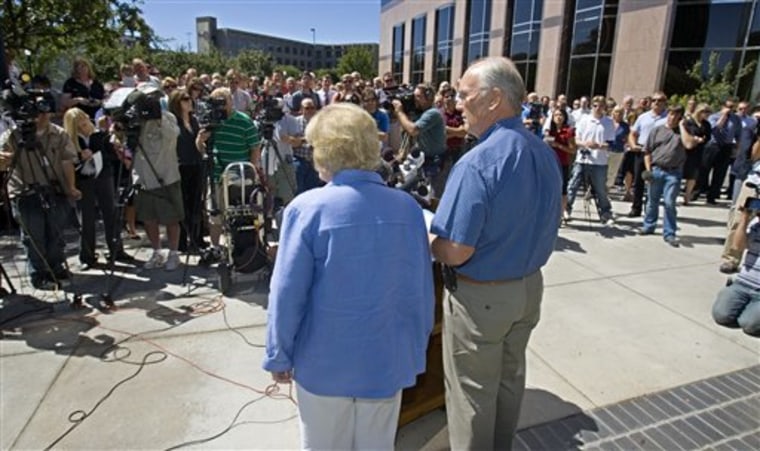Idaho Sen. Larry Craig isn't sticking to the script about how Washington sex scandals play out. In fact, he's following it backwards.
The rich history of powerful figures accused of misbehavior shows they tend to deny it indignantly, try to ride the storm with tortured explanations, then give in to contrition if they're cornered.
Not Craig. First came an admission of guilt - and now the defiant protestation of innocence.
Craig's difficulty
His declaration Tuesday that "I did nothing wrong" came weeks after he pleaded guilty to disorderly conduct in the men's room at Minneapolis airport. He vowed to tough it out even as his party's leaders called for a Senate ethics investigation.
Eric Dezenhall, a crisis-management consultant, has seen many follow this unwritten rule when fighting to save their career from scandal: "If you're guilty, repent; if you're innocent attack."
That could prove tough in Craig's case, in light of his plea. The Hennepin County, Minn., court docket said he paid $575 in fines and fees and was put on unsupervised probation for a year. A 10-day sentence in the county workhouse was stayed.
The undercover office who arrested Craig in the men's room alleged he had engaged in actions "often used by persons communicating a desire to engage in sexual conduct."
Mixed results
There's no clear road map to surviving the revelation of unsavory behavior - what works for one figure sinks another.
Gary Hart saw his presidential ambitions dashed by his "fool mistake" while Bill Clinton overcame multiple "bimbo eruptions" to win the presidency, then survived impeachment in the Monica Lewinsky scandal to leave office with high ratings.
Now, Capitol Hill is again looking into misconduct by one of its own, with memories still fresh of the explosive page scandal a year ago.
That episode led to the swift resignation of Florida Republican Rep. Mark Foley, months of recrimination during the election campaign over the stewardship of young people serving as congressional pages, and a criminal investigation that continues in Florida over whether Foley tried to seduce underage boys.
A scandal sampler:
• President Clinton gave evasive and misleading testimony under oath and publicly denied having sexual relations with "that woman," former intern Lewinsky, only to be forced into a humiliating reversal.
He was impeached and then acquitted in a 1999 Senate trial.
• Barack Obama, now running for the Democratic presidential nomination, found his entry into national politics eased when his Republican opponent in the 2004 Illinois Senate race, Jack Ryan, dropped out. Divorce papers filed by his wife alleged he had taken her to "bizarre clubs" and asked her to have sex in front of other people.
Ryan denied that. He acknowledged only that they went to one avant-garde club in Paris where they both felt creepy. Obama easily defeated Ryan's late replacement, Alan Keyes, in what had been a GOP seat.
• Rep. Bob Livingston, R-La., was on the verge of becoming House speaker in 1998 when he acknowledged straying in his marriage. He resigned from Congress in a couple of months.
• Sen. Hart, D-Colo., was the favorite for the Democratic presidential nomination in 1987, three weeks into his campaign, when The Miami Herald reported he had spent a night and a day with a young woman while his wife was away. Hart, who had challenged the press to check on rumors of philandering, initially denounced the report as preposterous. But his liaison with Donna Rice, who had also been photographed sitting on his lap near a yacht named "Monkey Business," sank his campaign.
• Sen. Bob Packwood, R-Ore., resigned in 1995 amid allegations he made unwanted sexual advances to 17 female employees and colleagues, solicited jobs from lobbyists for his former wife and altered his personal diaries to obstruct an ethics investigation.
• Rep. Gary Condit, D-Calif., lost re-election in 2002 after the disappearance of his former intern, Chandra Levy. Her remains were found in May 2002 in a Washington park and no one has been charged in her death. Condit reportedly told police that he and Levy had had an affair, although he swore in a deposition that they were just friends. He denied involvement in her disappearance.
• Rep. Barney Frank, D-Mass., was reprimanded by the House in 1989 for using his influence on behalf of prostitute Stephen Gobie. Frank admitted paying Gobie for sex, hiring him with his own money as an aide and writing a letter on his behalf.
A repentant Frank faced constituents at a meeting until they ran out of questions, acknowledging, "I did not handle the pressures of having a public life, of being a closeted gay man, nearly as well as I should have."
He won their acceptance - and re-election ever since.
